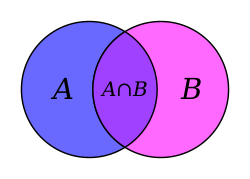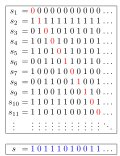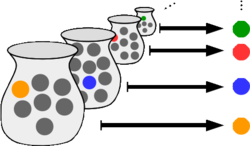In mathematics, a set A is Dedekind-infinite (named after the German mathematician Richard Dedekind) if some proper subset B of A is equinumerous to A...
12 KB (1,751 words) - 15:44, 10 December 2024
choice is also true, then infinite sets are precisely the Dedekind-infinite sets. If an infinite set is a well-orderable set, then it has many well-orderings...
8 KB (917 words) - 03:24, 10 May 2025
pronounce Dedekind. List of things named after Richard Dedekind Dedekind cut Dedekind domain Dedekind eta function Dedekind-infinite set Dedekind number...
16 KB (1,750 words) - 15:38, 30 May 2025
Equinumerosity (redirect from Equinumerous sets)
Dedekind-infinite. The axiom of countable choice (ACω), a weak variant of the axiom of choice (AC), is needed to show that a set that is not Dedekind-infinite...
14 KB (1,822 words) - 19:23, 26 May 2025
Dedekind–Hasse norm Dedekind-infinite set Dedekind–MacNeille completion Dedekind's axiom Dedekind's complementary module Dedekind lattice Jordan–Dedekind lattice...
1 KB (93 words) - 15:40, 20 March 2022
contradictions within modern axiomatic set theory. Set theory as conceived by Georg Cantor assumes the existence of infinite sets. As this assumption cannot be...
17 KB (2,657 words) - 12:12, 29 April 2025
the definition of an infinite set being any set that has a proper subset of the same cardinality (i.e., a Dedekind-infinite set); in this case {2,3,4...
26 KB (3,834 words) - 23:33, 1 June 2025
to exist infinite Dedekind-finite sets that are not amorphous. No amorphous set can be linearly ordered. Because the image of an amorphous set is itself...
5 KB (673 words) - 23:02, 1 June 2025
First Course in Noncommutative Rings. Springer Science & Business Media. ISBN 978-1-4684-0406-7. Dedekind-infinite set Von Neumann regular ring v t e...
2 KB (146 words) - 23:59, 11 August 2023
Transfinite number (redirect from Infinite number)
cardinal to refer to the cardinality of a Dedekind-infinite set in contexts where this may not be equivalent to "infinite cardinal"; that is, in contexts where...
10 KB (1,232 words) - 08:58, 23 October 2024
{\displaystyle \aleph _{0}} (namely, the cardinalities of Dedekind-finite infinite sets). Sets of these cardinalities satisfy the first three characterizations...
6 KB (884 words) - 06:49, 8 April 2025
Dedekind-finite set is a set that is not Dedekind-infinite. (These are also spelled without the hyphen, as "Dedekind finite" and "Dedekind infinite"...
91 KB (11,628 words) - 12:22, 21 March 2025
number) of the set. A set that is not a finite set is called an infinite set. For example, the set of all positive integers is infinite: { 1 , 2 , 3 ,...
15 KB (2,013 words) - 15:42, 10 May 2025
uncountable sets, that is, sets that are not countable; for example the set of the real numbers. Although the terms "countable" and "countably infinite" as defined...
28 KB (4,381 words) - 01:01, 29 March 2025
Pigeonhole principle (section Infinite sets)
Blichfeldt's theorem Combinatorial principles Combinatorial proof Dedekind-infinite set Dirichlet's approximation theorem Hilbert's paradox of the Grand...
31 KB (4,184 words) - 17:03, 15 May 2025
Cantor to Dedekind, the first dated July 28 and the second dated August 3. The role of the absolute infinite in Cantor's conception of set Infinity and...
10 KB (1,306 words) - 18:06, 6 May 2025
mathematicians Richard Dedekind and Georg Cantor in the 1870s. In particular, Georg Cantor is commonly considered the founder of set theory. The non-formalized...
54 KB (6,575 words) - 12:01, 1 May 2025
here is a proof (from ZF + ACω) that every infinite set is Dedekind-infinite: Let X {\displaystyle X} be infinite. For each natural number n {\displaystyle...
10 KB (1,259 words) - 14:17, 15 March 2025
greater than the smallest infinite ordinal ω {\displaystyle \omega } , it follows that the consistency of second-order Zermelo set theory (and therefore also...
15 KB (2,239 words) - 02:36, 15 January 2025
Total order (redirect from Infinite descending chain)
contains an ordered subfield that is isomorphic to the rational numbers. Any Dedekind-complete ordered field is isomorphic to the real numbers. The letters of...
22 KB (3,150 words) - 15:51, 11 May 2025
Galileo's paradox (category Paradoxes of set theory)
as another, but that each line contains an infinite number. — Galileo, Two New Sciences Dedekind-infinite set Hilbert's paradox of the Grand Hotel MW Parker...
7 KB (988 words) - 16:10, 25 April 2025
0.999... (redirect from Infinite series of nines)
are more self-contained. In the Dedekind cut approach, each real number x {\displaystyle x} is defined as the infinite set of all rational numbers less than...
90 KB (11,654 words) - 04:41, 2 June 2025
used sets of ordinals to produce an infinity of sets having different infinite cardinalities. His work on infinite sets together with Dedekind's set-theoretical...
102 KB (7,563 words) - 02:18, 14 May 2025
B = {1, 2, 3, 4, 5, 6, 7}. A more elaborate example (involving two infinite sets) is: A = {x is an even integer larger than 1} B = {x is an odd integer...
14 KB (1,989 words) - 08:46, 6 May 2025
Cantor's diagonal argument (category Set theory)
are infinite sets which cannot be put into one-to-one correspondence with the infinite set of natural numbers – informally, that there are sets which...
27 KB (2,751 words) - 02:16, 12 April 2025
Georg Cantor (redirect from Absolute infinite, well-ordering theorem, and paradoxes)
to prove it. In 1899, he sent Dedekind a proof of the equivalent aleph theorem: the cardinality of every infinite set is an aleph. First, he defined...
85 KB (10,164 words) - 12:57, 28 May 2025
Real number (redirect from Set of real numbers)
Secondly, both definitions involve infinite sets (Dedekind cuts and sets of the elements of a Cauchy sequence), and Cantor's set theory was published several...
61 KB (8,195 words) - 16:29, 17 April 2025
In mathematics, a Dedekind domain or Dedekind ring, named after Richard Dedekind, is an integral domain in which every nonzero proper ideal factors into...
24 KB (3,715 words) - 01:53, 1 June 2025
infinity, which guarantees the existence of at least one infinite set, can be used to construct the set of natural numbers, N 0 {\displaystyle \mathbb {N} _{0}}...
15 KB (2,229 words) - 02:12, 26 May 2025
Axiom of choice (section Restriction to finite sets)
implies the equivalence of infinite and Dedekind-infinite sets, but that the equivalence of infinite and Dedekind-infinite sets does not imply the axiom...
59 KB (7,917 words) - 15:47, 15 May 2025













